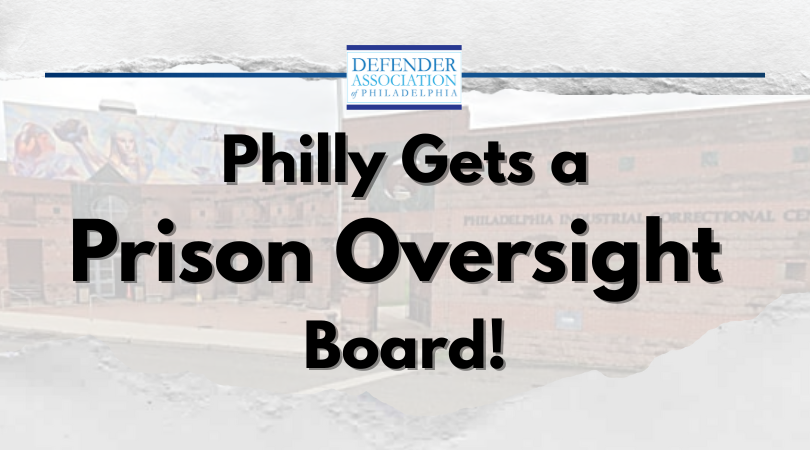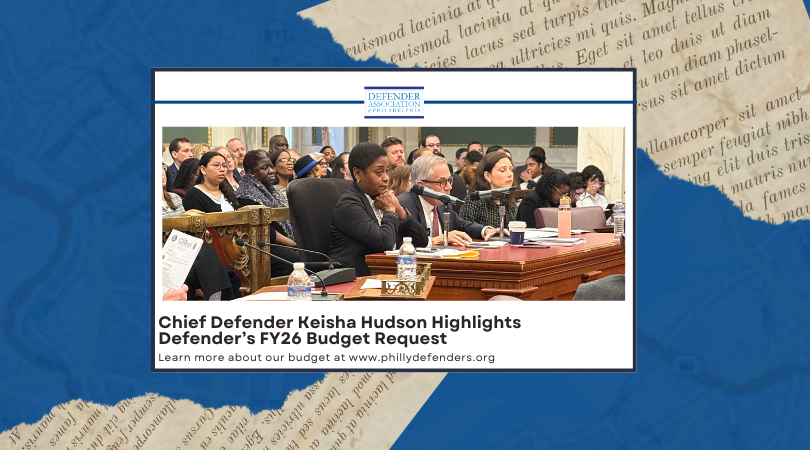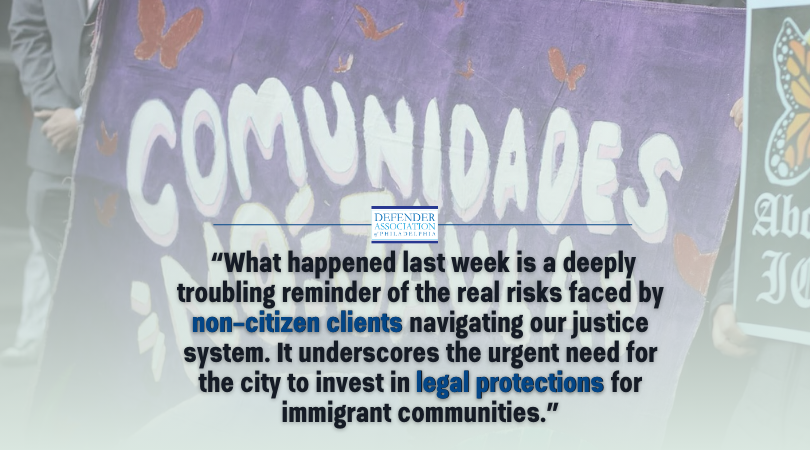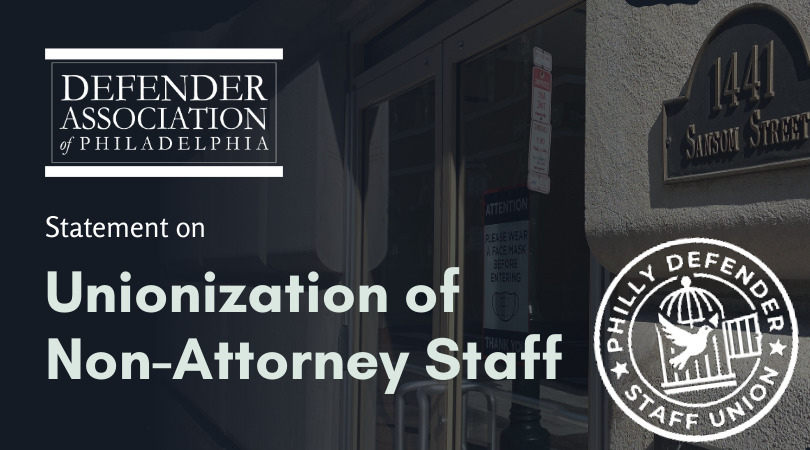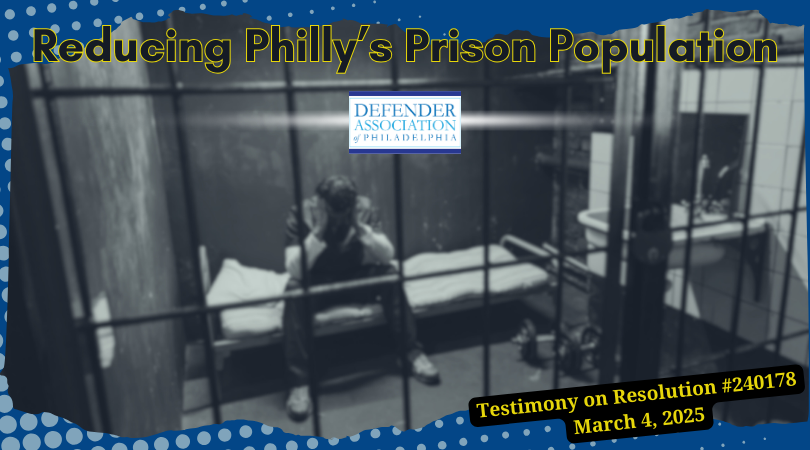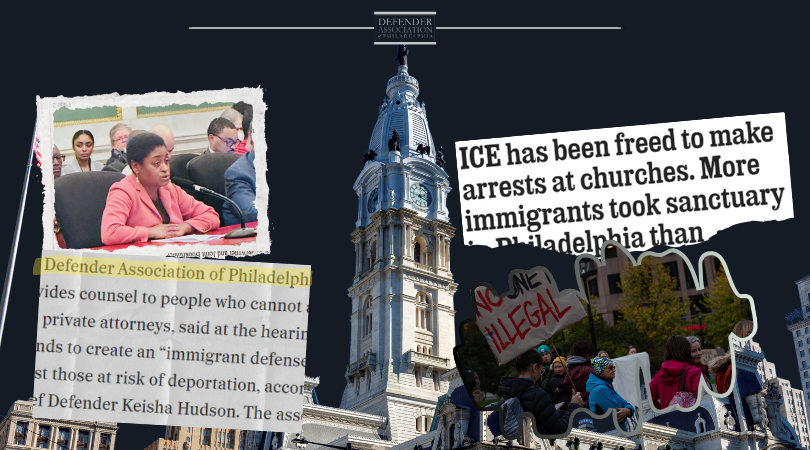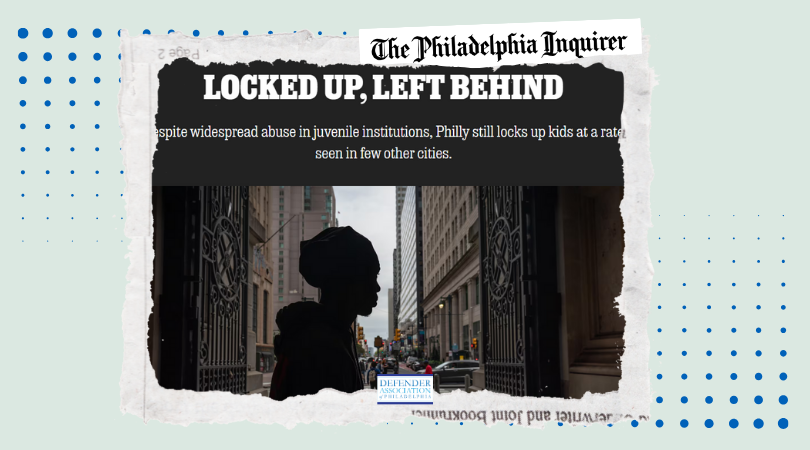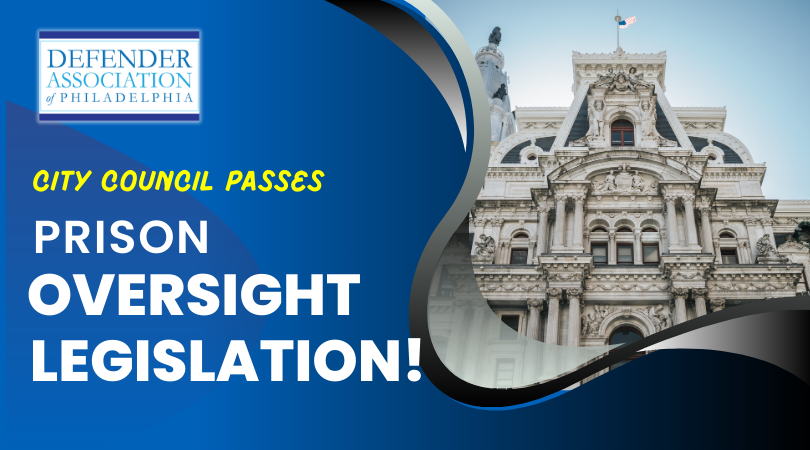Good morning Committee Chairs Jones and Thomas, and members of the Committees on Public Safety and Legislative Oversight. I’d like to thank Councilmember O’Rourke for inviting me here to testify on Resolution No. 240718, and give some of our insights into the actions we should take to safely reduce the jail population and improve conditions for incarcerated people and employees at the jail.
My name is Keisha Hudson and I serve as the Chief Defender of the Defender Association of Philadelphia. I’ve held this role for 4 years and have been a public defender for the last 22.
Before discussing the challenges and potential solutions, it’s important to note the Philadelphia Prison is required to take people who are court ordered to the jail and hold them for as long as the court orders their detention. The jail can’t send them away, or independently determine they should be released on supervision or for transportation to a substance use treatment facility. They don’t have control over how long the person’s case takes to resolve, whether a detainer will be lifted, or whether or not the person can afford to post bail to secure their release. They don’t determine how long of a jail sentence a person will receive or how much of that sentence they will be required to serve.
And yet, all of these factors play a significant role in the population at the jail and therefore the conditions experienced by incarcerated people.
Our office understands that while we can’t control most of the issues related to conditions of confinement, we can, and have, prioritized initiatives that expedite our clients release from the jail, and in some cases avoid detention altogether. These include:
Staffing Preliminary Arraignment Court twenty-four hours a day/seven days a week;
Early Bail Review hearings;
Emergency Bail hearings; and
Our new grant funded Bridge Home project, which helps prepare Early Release Petitions for and provide re-entry support for people released on parole.
Preliminary Arraignment
In Philadelphia, the first hearing for anyone arrested on a new criminal offense is a preliminary arraignment. Philadelphia does not have a summons process and so everyone must come through preliminary arraignment for a review of the charges against them and a determination about bail. It is a high volume court room which is staffed 24 hours a day, 7 days a week and on holidays.
At that hearing, the arrestee appears by video while advocates from the DAO and Defender are in the courtroom. Unlike most counties in the Commonwealth, people arrested in Philadelphia are represented at this initial bail determination. Unfortunately, advocates have little information available to them to make their best arguments. Defender representatives are in the court house while the clients are attending virtually from police stations throughout the city. The hearings typically last less than two minutes.
With support from the MacArthur Safety and Justice implementation team—including the First Judicial District (FJD), District Attorney’s Office (DAO), Department of Behavioral Health and Intellectual disAbility Services (DBHIDS), Office of Prosecutor Services (OPS, formerly Major Trials Division), and Philadelphia Police Department (PPD)—our office successfully petitioned to install communications equipment in the courthouse. This allowed us, as capacity permitted, to conduct pre-arraignment interviews with arrestees.This has better enabled our office to not only prepare people for what to expect, but also gather information to present to the magistrate so he or she can make a more informed decision about bail.
Early Bail Review
Early Bail Review, or “EBR” hearings typically occur within 5 days of the person’s arrest and present an opportunity for the court to review the appropriateness of a person’s continued detention. These hearings, initiated ten years ago, are now an essential component to the courts’ processes.
To prepare for these hearings, our office developed an expedited interview process and ensured robust advocacy. This includes identifying clients’ social service needs, connecting them to appropriate supports, and providing judges with the information needed to make more informed, individualized decisions. The social service advocates virtually attend the court hearings and are available to provide additional information about resources available to meet clients needs. The workload itself is significant. Last year, our office prepared for and staffed over 4,500 individual EBR hearings.
Our ability to address these bail concerns early in the process helps the courts identify people who can be safely released without any undue delay. It alleviates the burden on our overcrowded detention facilities while supporting fairness and a more efficient and equitable judicial process. This benefits those involved in the criminal justice system, as well as the community it serves.
While all other stakeholders have sustained their funding from the MacArthur initiative - our office has not. This year our funding from the city to continue the initiatives in preliminary arraignment and early bail review hearings is set to end June 30, 2025. And our office will require $750,000 to be added to our base budget to sustain this work.
Emergency Bail Hearings
The Emergency Bail Hearing is a relatively new strategy and represents some of the best of what we can achieve when system stakeholders work together to tackle the challenge of prison overcrowding. Developed with the support of the Prison, the DAO, and the FJD, our office reviews weekly reports provided by the jail of people who are incarcerated, without detainers, on less than a $100,000 bail. This data is not available to us, and we could not do this project without their support.
Experienced attorneys at our office review the report, work in collaboration with social services as needed, and file for clients to be added to the hearings list. A senior member of the FJD presides over the calendar and makes determination about whether continued detention is warranted or whether the person can be released with or without conditions. A senior member of the Executive Team staffs those hearings. To date over 100 people have been released without compromising public safety.
Forensic Intensive Recovery
The Forensic Intensive Recovery (FIR) program was established in 1991 in response to a federal consent decree related to overcrowding in Philadelphia jails. FIR referrals were implemented as a population reduction strategy by removing those in need of treatment.
FIR is an alternative to incarceration program. Essentially, individuals who are incarcerated are referred for evaluation by a FIR evaluator to see if they qualify for release in favor of placement at a substance abuse or mental health treatment facility. The evaluators are contracted by the City of Philadelphia to conduct the evaluations, generate and distribute reports, and assist in matching the client with an appropriate level of care. Our office processes all FIR referrals for our clients as well as those referred by private and court appointed attorneys.
As a result of our attorneys direct experience representing clients, we decided to take a closer look at the wait times people referred to the FIR program experience. From April to June 2024, 654 FIRs were filed for 615 unique individuals. For 37 individuals, more than 1 FIR was filed on their behalf during an identical incarceration event so we only counted one FIR. For 2 individuals, more than 1 FIR was filed but during different incarceration periods, so we counted them as two unique referrals. So our final referral count was 617 FIRs for 615 individuals.
Our review revealed that on average, it takes over two months for incarcerated people referred to FIR to be released from the jail. It takes an average of 35 days from referral for the incarcerated person to be evaluated and then another 12 days for the report to be generated and circulated to justice system stakeholders. In 18% of referrals (113 individuals), the clients were released from the jail prior to their evaluation and were never evaluated by FIR. This is a missed opportunity to intervene. While we don’t usually discuss re-arrest, 45 of the clients (39%) released prior to their evaluation were subsequently re-arrested and re-admitted to the jail within 6 months.
This process is not a sustainable solution to the substance use crisis we’re facing in Philadelphia. The social services staff in our office can actually connect clients with evaluations and appropriate placements more effectively and efficiently. However, with a limited number of social service advocates supporting all our clients, we currently lack the capacity to provide direct case management and coordination services to fully meet this need.
An additional investment in our office to expand our social services capacity to better serve all of our clients with substance use and behavioral health needs–especially those residing in or arrested in Kensington–would go a long way to reducing the jail population and relieving the burden on the FIR program.
We would also like to partner with the city agencies that are working to draft the RFP for FIR and designing the scope of work for the contract. We believe that we, as well as stakeholders from the Prison, from the FJD, and from the DAO could have valuable insight into some of the key performance indicators and deliverables necessary to improve the quality of this program.
Early Release Petitions
Last year our office was selected to receive a re-entry grant from the Pennsylvania Commission on Crime and Delinquency. The purpose of our program is to assist with re-entry planning for incarcerated clients. Specifically, a grant-funded re-entry specialist completes a needs-based assessment for incarcerated clients, gathers pertinent mitigation information, and develops pre- and post-release plans to ensure success upon reintegration into the community and help reduce recidivism. Our attorneys rely on these plans to file petitions for early release for clients serving county jail sentences.
Our re-entry specialists provide direct case management upon release to support the client as they navigate parole and transition home. This program works because it connects people with the reentry programs and services that the city already offers. It serves as a complement to the programs that already exist without offering duplicative services. Our service adds to the existing continuum of programming because we are able to anticipate possible releases because our office also files the petitions for release. As the initiative grows we will continue to connect people to existing programs in a meaningful way and continue to advocate for more predictability in reentry processes.
This work not only helps to decarcerate the jail but also provides a bridge of support that also relieves some of the workload from the county parole officers. This is still a pilot program, but we believe with an infusion of funding we could provide similar services to our young people coming home from placement or the youth detention facility who are more susceptible to adult arrest than non delinquency system-involved peers.
Conclusion
The Defender Association is committed to reducing the jail population, improving conditions for incarcerated people and jail staff, and creating more alternatives to detention. Sustaining and strengthening these efforts requires increased investment and ongoing collaboration with city leaders and our justice system partners. With more resources for our social services team, faster access to diversion programs, and stronger partnerships, we can create a more effective and equitable system—one that prioritizes rehabilitation, lowers recidivism, and improves public safety for all Philadelphians.
